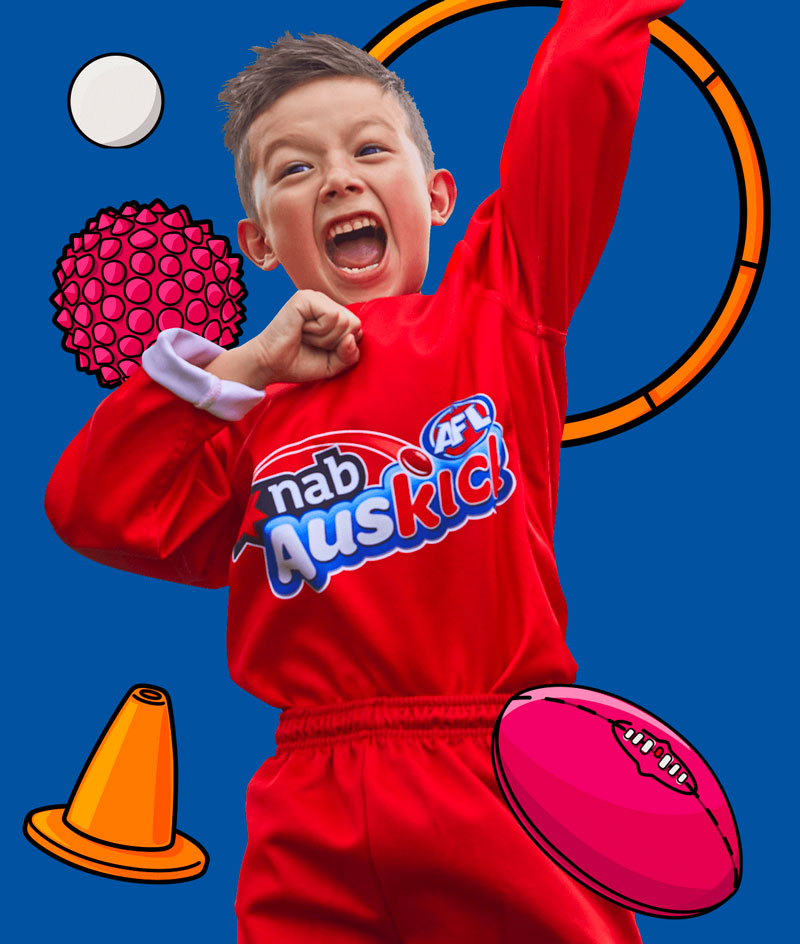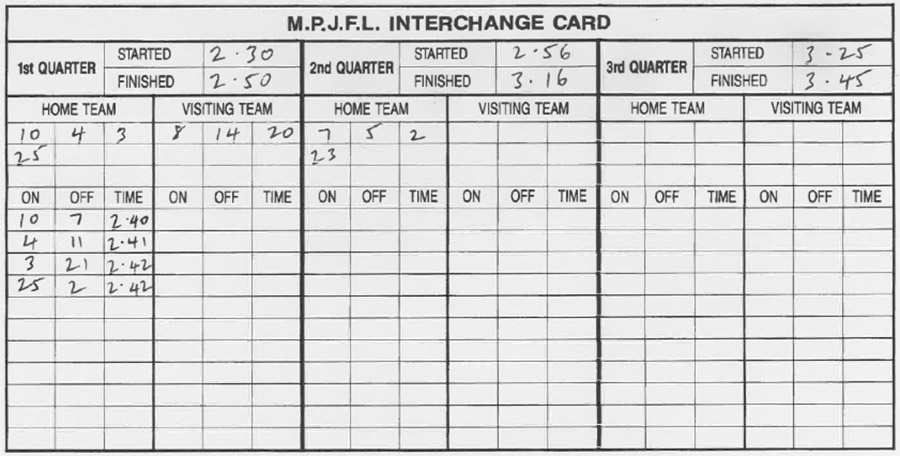We appreciate all the amazing parents, players and local businesses that make SJFC the great community club that it is!
We love bringing everyone together… at our monthly dinners, social nights, community lunches and presentation events!
Upcoming Events
Sorrento Junior Auskick
Friday Nights 4-5pm at Macfarlan Reserve, Sorrento
For boys and girls aged 5-8 years wanting to get a feel for the game and have some fun with their mates.
For more information Email auskick@sorrentojuniorfc.com

Club Volunteers
It’s the dedication of so many fabulous volunteers that make SJFC the great community club that it is! We welcome your contribution at all levels : committee, game day (so many of you!), behind the scenes etc… We are always after help from parents at the club. We need volunteers for our Sunday night sessions and social functions. Please contact the secretary if you would like to volunteer at these events. Please and thank you!
Game Day at Sharks JFC
Volunteering on game day? Runner. Water Carrier. Goal and Boundary Umpire. Time Keeper. Interchange Steward. All these roles are really important, the game could literally not go on without them.
See role descriptions below and you will require a current Working With Children card, apply at workingwithchildren.vic.gov.au Contact your Team Manager if you are interested in assisting on game day.
A note to all volunteers: If you have any concerns or questions about an opposition player or official during the game, please report it to your Team Manager. Do not take matters into your own hands.
Role Descriptions:
Equipment
- Please wear the club-supplied white top that has the words BOUNDARY clearly marked on it, along with dark pants/shorts.
- Your team manager will supply you with a whistle.
Umpiring
- You will take one side of the ground, the opposition umpire will take the other.
- If the ball goes out of bounds (not on the full), blow your whistle with one arm raised. The field umpire will signal you to throw the ball in, and you then throw the ball over your head about 5-8 metres to the ruck contest.
- If the ball goes out of bounds (on the full), blow your whistle with both arms out-stretched and the umpire will award a free kick to the opposing player where the ball crossed the boundary line.
- When throwing the ball in at a stoppage, the general direction of the throw should be towards the centre square.
- Please do not come between the ball and players during the game.
- Do not speak to any opposition players.
- Do not speak to any opposition officials.
- Do not coach your own team’s players.
If you have any concerns or questions about an opposition player or official during the game, please report it to your Team Manager. Please don’t take the matter into your own hands.
Equipment
- Your Team Manager will give you two white goal umpire flags, a white jacket and a goal umpire score card (U11s and up).
Signalling a score
- Once you receive the all clear from the umpire (they will show two hands in front of face goal and one hand in front of face behind) when the ball passes between the two main posts by raising his/her hands and pointing with both index fingers and then waving both flags to signal the score to the goal umpire at the other end of the ground.
- A point is signalled by raising one hand in such a manner when the ball passes between one of the main posts and one of the smaller posts and then waving one flag.
- If the ball hits, or passes over a goal post it will be signalled as a point by patting the goal post, then signalling appropriately.
- If the ball bounces and hits the behind post, in it ruled ‘out of bounds’.
- If the ball hits without bouncing or goes over the behind post, in it ruled ‘out on the full’.
Flag waving
- The first movement is for the goal umpire to raise their flag or flags above their head at a position akin to 11 and 1 on a clock face.
- The flag waving process for a goal requires the flag to be brought from the starting position across once, back once, and down to the sides.
- For a behind only one flag is required. From starting position across, back and down.
Positioning tips
- The trick to positioning is to always have the ball in front of your line of vision coming towards you. For example, if the ball is coming from your left as you look out you should move to your right to keep the ball in front of your line of vision.
- Generally you should try and stay 1m to 1.5m behind the line to avoid getting caught in the field of play.
- For any ball dropping on the line you need to straddle the line side on to the ball and the players.
Decision making
- The decision point is when the whole of the ball crosses the line.
Recording the score
- In U11s and above it is the role of the goal umpire to keep score. At each of the breaks you will need to confer with the opposing goal umpire to ensure the scorecards are correct.
If you have any concerns or questions about an opposition player or official during the game, please report it to your Team Manager. Please don’t take the matter into your own hands.
Equipment
- Your Team Manager will give you an Interchange Card. Please make sure you have a watch or phone for timekeeping.
Interchange procedures
- Position yourself seated near the boundary line within the white lines of the interchange area (usually midway between the coaching boxes).
- On the interchange card provided, record the start and finish time of each quarter.
- Before each quarter, record the jumper numbers of all players on both benches.
- As each player takes the field during the game record the jumper number of the person coming off and the time that it happened.
- If a player has been ordered off with a YELLOW card, the word ORDER is to be shown in the ON column with the jumper number in the OFF column. The player cannot resume playing until 15 minutes of playing time has elapsed (this does not include quarter breaks – it is playing time). When the player or his substitute returns to the field, show the jumper number in the on column with the word TIME in the off column. Yellow carded players cannot be substituted until their 15 minutes are up.
- When a player is ordered off the ground with a RED card, this player is reported and cannot take the field for the remainder of the match, but can be substituted after 20 minutes of playing time (this does not include quarter time breaks). Umpires can report players after the game even if they have received a yellow card.
- You may be asked by the umpire to assist in a player count. Please stay in the interchange area when doing so.
- At the end of the game, cross check with the oppostion’s Interchange Steward and ensure that all details on the Interchange Card are correct.
Equipment
- Your Team Manager will give you a Time Card. Please make sure you have a watch or phone for time keeping.
Timekeeping procedures
- The Time Keeper shall keep time and record scores (excluding Under 9s and 10s) for each quarter, and sound the siren for the commencement and conclusion of each quarter.
- The Goal Umpires scores will determine the winner of the match, so keep a close watch on any scores. Note: at grounds with an electronic scoreboard, the timekeepers will often be responsibe for entering the scores electronically, in addition to filling in the Time Card.
- If the field umpire raises the game ball above their head as they enter the ground please sound the siren once.
- When the quarter begins, do not sound the siren until the signal from the umpire is received – generally this signal is the umpire raising the ball over their head.
- Please print your name on the card, – no signatures allowed.
- The length of time for each quarter and ech break is printed on the back of the Time Card.
- No time-on is added in any junior competition matches.
- At the end of the game, cross check with the oppostion’s Time Keeper and ensure that all details on the Time Card are correct.
Equipment
- Your Team Manager will give you an orange vest that has the word “Runner” clearly marked on it.
- At home games, you will need to collect the game ball from the umpires at the end of the game (as you escort them back to their rooms) and return it to your Team Manager.
Rules for runners
Your role is to deliver messages from the coach to the players. When performing this role:
- Deliver the message and return to the highlighted coaching area.
- Don’t linger on the ground.
- Do not speak to any opposition players.
- Do not speak to any opposition officials.
- Do not speak to the umpire.
- Stay outside the 50 metre arc when a team is kicking in after a behind is scored.
- Stay outside the centre square area at a ball up.
- IMPORTANT! Escort the umpire off the ground to their change rooms at the end of the game.
Equipment
- Your Team Manager will give you an blue top that has the word “Water” clearly marked on it.
- You are also responsible for maintaining and filling the team’s set of water bottles, provided by the club.
Rules for carrying water
Your role is to deliver water to the players and, during breaks, the umpires. When performing this role:
- Do not speak to any opposition players.
- Do not speak to any opposition officials.
- Do not coach the players.
- Position yourself on the boundary fence, at least 20 metres from your coach’s box. A good area to stand is near the interchange gate.
- Ideally deliver water to the players during main breaks or when a goal is scored.
- Do not linger on the ground.
- You can enter and leave the field of play at any point on the boundary.
- Stay outside the 50 metre arc when a team is kicking in after a behind is scored.
- Stay outside the centre square area at a ball up.
- During the major breaks, please offer water to the field umpire/s in the centre of the ground, but please do not engage in conversation with them.

